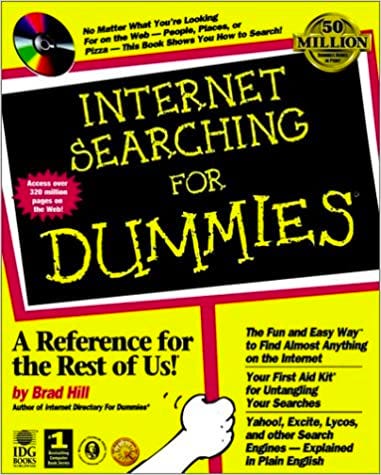“We are drowning in information, while starving for wisdom.” - E. O. Wilson
We have a problem that is only getting worse: the internet is full of information, but it’s increasingly difficult to find the information you’re looking for and digest the wisdom to be found amongst the mess.
Many online are starting to wonder: “am I doing something wrong here?”
“I used to have better time googling in the past. I struggle to find things I remember finding in the past using google. I think I might be stuck in some old habits of googling and I've lost touch with modern google.” - Hacker News
Some blame Google search, arguing it has stopped doing its job.
Perhaps articles have gotten longer, more abundant, and less informative - better with search keywords and worse with content?
Or perhaps, I’ve become a worse skim-reader more captivated by the words on screen than the nugget of wisdom I am searching for, but I seriously doubt it. Most of the time I’m pretty distracted online, not captivated.
Point is, there is simply too much information online, and finding critical knowledge has become a full-time job (my full-time job, actually).
Searching online is like flipping through the directory at the local library just to find one specific book on a topic.
(In case you’re wondering, Internet Searching for Dummies is the book I was looking for.)
But isn’t this organization of information the very problem that the computers solve? To hell with the library directory!
Google's own mission statement is to “organize the world's information and make it universally accessible and useful.”
Somewhere along the way we lost the “universally accessible and useful” bit. We created too much new & useless information to obscure the true and useful information underneath.
More than 2 million blogs are posted online every day.
Wisdom flows abundantly online, but it’s lost in the sheer volume; like drinking water from a firehose.Even if you made a short-list of only a thousand sage bloggers, every “expert of this” and “guru of that”, it would take a full team to digest their words and bullet out the main takeaways. Right?
So that takes us to today. The state of affairs if you will.
I do emerging technology consulting and one of the feelings I am all too familiar with is skim-reading article number five, or God forbid, article number ten to gather knowledge and stats on a topic. It can be grueling.
So, the past few months I began testing AI Large Language Models (LLMs) on this problem.
LLMs are AI trained on much of the content on the internet, capable of understanding language and predicting what to “say next” in a sentence or paragraph.
To be specific, I began using the famous OpenAI GPT3 and ChatGPT programs.
I would feed the AI an article and ask it a series of questions about content, summaries, key points, and statistics within.
The discovery I made is that AI is already remarkably good at discerning which information is useful in everything from a casual blog to an academic journal.
The AI was summarizing!
The next thing I found is that, given the knowledge base the AI was trained on, it does a stellar job of answering followup questions about context in the article, or explaining technically complex topics like nuclear fusion or rocket science.
The result is an AI assistant which is contextually aware of the article it is reading, and broadly knowledgeable on a depth of studies surrounding it.
It was teaching me interrelated concepts that weren’t even in the text!
This way, my learning on a subject resembled a teacher-student conversation, rife with curiosity and quick answers.
With the AI, my flow of thought on a specific article would never be interrupted by pages of Google search results and ads.
So we decided to package this tool in the simplest form I know how: a browser extension which you can use to summarize anything, and ask any questions, on-the-fly.
We’re building the ultimate research assistant. And the ultimate in-browser teacher.
Time is your most precious asset. We aim to give that back to you by getting you the information you need in half the time.
It’s called Brief Bear. We’re developing Brief Bear with one primary goal in mind: make the internet rapidly skimmable and digestible.
Brief Bear is like C-3PO if all he did was speed-read long-form wisdom and spit out abbreviations. He will never tell you the odds unless those odds are a key takeaway or statistic from an article.
And he lives right there - on your browser window ready to go.
I know this is quite a long post, so I asked Brief Bear to summarize it for me. Here’s the TL;DR:
Summary: The internet has become overwhelmed with information and it has become increasingly difficult to find useful knowledge among the mess. The author, who does emerging technology consulting, has been testing AI Large Language Models (LLMs) such as OpenAI GPT3 and ChatGPT on this problem and discovered that they are already capable of discerning useful information from articles and summarizing them. He created a browser extension called Brief Bear to package this tool in a simple form to help users quickly skim and digest information on the internet.
Key takeaways:
-
The internet is full of information but it's increasingly difficult to find useful knowledge
-
AI Large Language Models (LLMs) are capable of discerning useful information from articles and summarizing them
-
The author created a browser extension called Brief Bear to make the internet rapidly skimmable and digestible
-
Brief Bear aims to give users back time by getting them the information they need in half the time
-
The tool is designed to help users with research and make the internet more efficient to use.
What do you think? If you’re interested in becoming a faster researcher and learner, check out Brief Bear here: briefbear.com
from Hacker News https://ift.tt/gz1Qom3



No comments:
Post a Comment
Note: Only a member of this blog may post a comment.